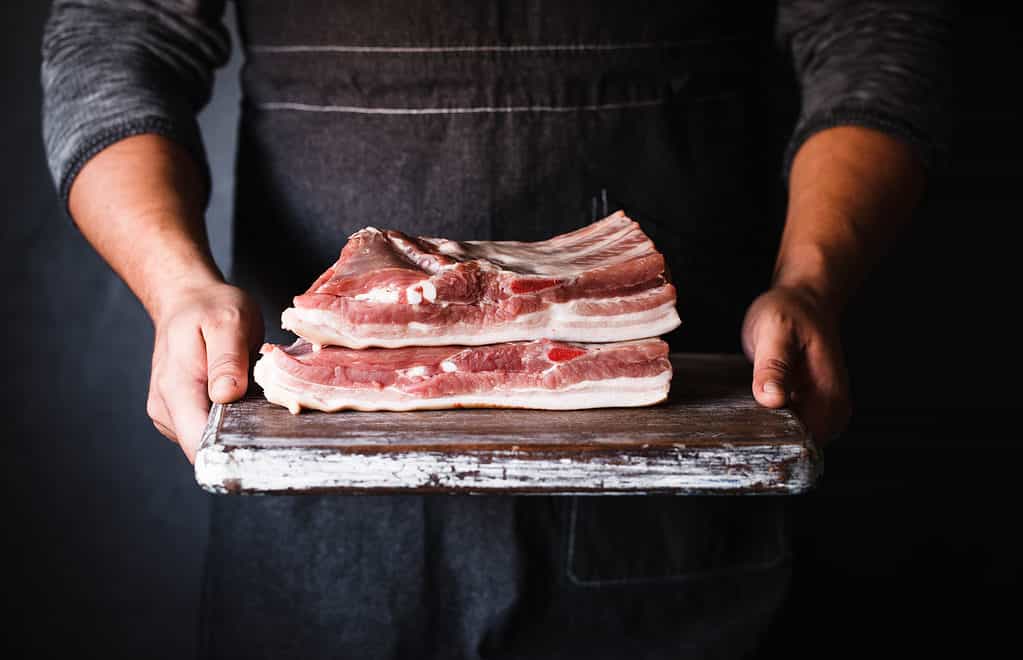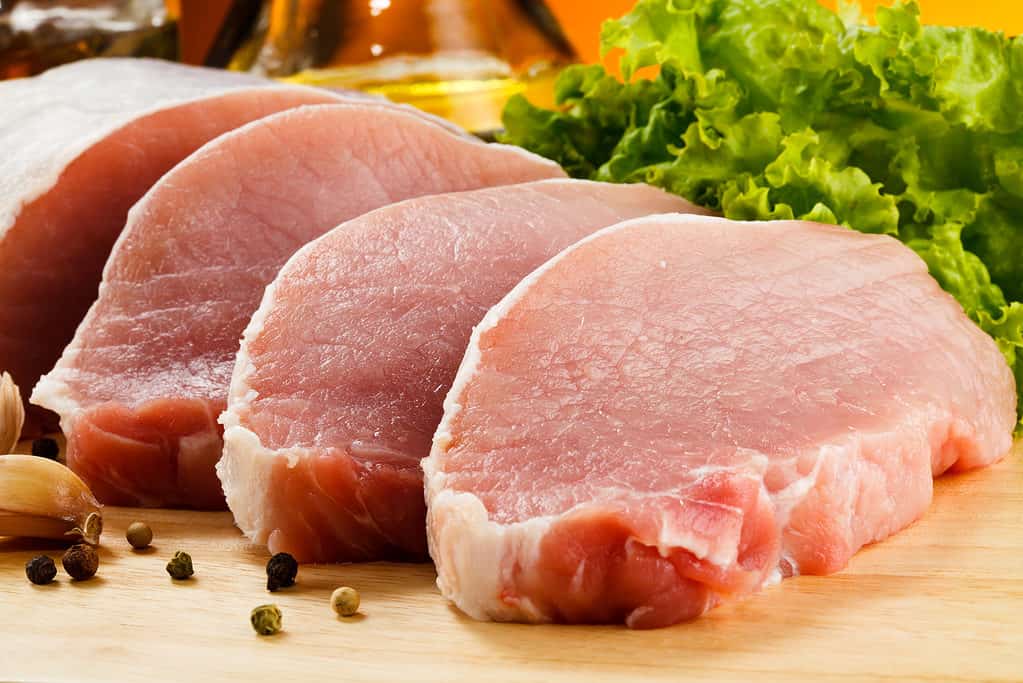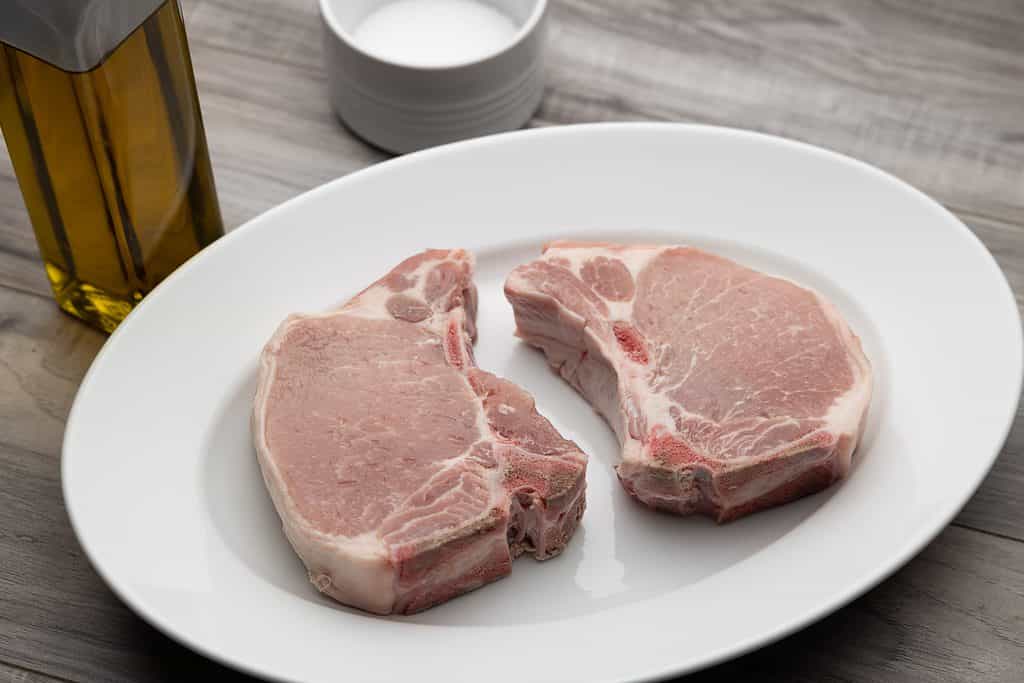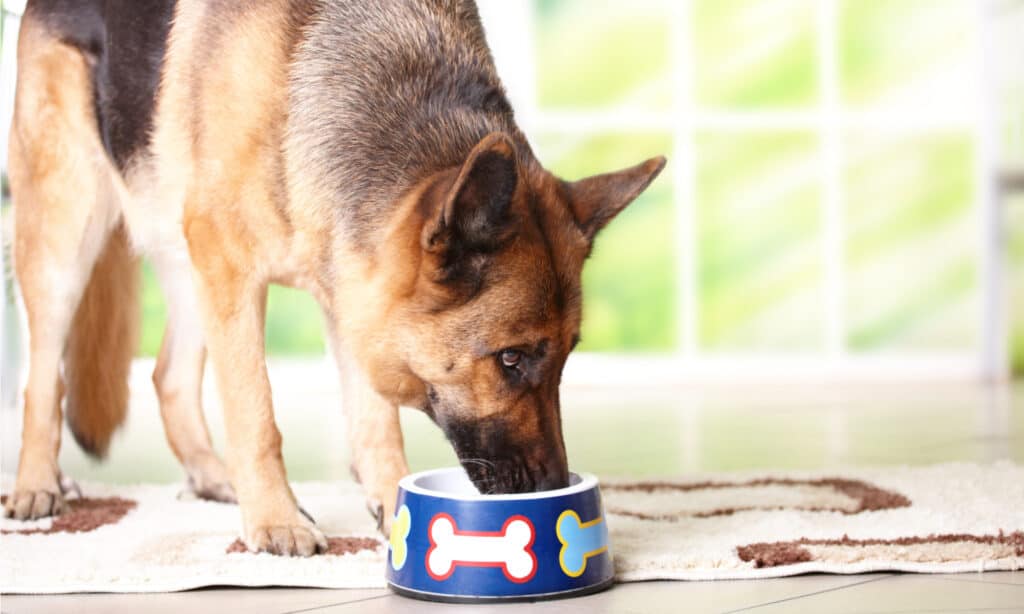It’s no secret that dogs love meat. Luckily, most types of meat are safe for dogs to eat in moderation, including pork. Pork isn’t toxic and can be enjoyed by most canines. It’s an everyday staple in most homes so many dogs will have access to it at some point. Many owners may even use it as a high-value treat for teaching difficult commands, like recalls.
However, that doesn’t mean you should feed your dog lots of pork. A large portion of a dog’s diet does need to be meat. But they aren’t obligate carnivores like cats. They require other foods in their diet, too. Pork doesn’t contain everything your canine needs and may cause nutritional deficiencies when fed in high amounts.
For the more part, your dog does need to be consuming commercial dog food. You can use pork as an occasional treat or snack when appropriately prepared. Dogs cannot consume all pork that humans can, nor can they consume raw pork.
How to Prepare Pork for Dogs

If you feed your dog pork, make sure you follow the caveats to do it safely. Never season it, not even with salt, and never feed them bones.
©casanisa/Shutterstock.com
To feed pork to your dog, you have to prepare it safely. At the very least, this means no seasonings. While all seasonings are safe for humans, many are toxic to dogs. Onions and garlic come to mind, including dried seasonings containing these ingredients. Most meat seasonings are unsuitable for dogs, as they usually include toxic ingredients.
Furthermore, you cannot salt the meat. Dogs are much smaller than people (usually) and more sensitive to added salt. While dogs need some salt, all they need is included in their regular diet. Therefore, they don’t need any added salt in their meat. It can cause issues over time and in the short term.
You should provide a small portion of pork at a time, especially if your dog isn’t used to consuming pork. Consuming too much pork isn’t always harmful but can cause stomach upset. If your dog isn’t used to consuming pork, it may cause their stomach issues. If your dog shows discomfort, you should limit the amount even more.
Some dogs will never be able to stomach much pork. It just depends on their stomach.
You should never give your dog cooked pork bones, as these can lead to choking hazards. Pork bones can also splinter, causing tears in the digestive system. While this isn’t always serious, it absolutely can be. Often, vet attention will be necessary, as splinters can be deadly.
Can Dogs Eat Raw Pork?

Dogs should not eat raw meat. It’s not healthy for them, and it’s not healthy for their families, either.
©Jacek Chabraszewski/Shutterstock.com
Sadly, no. Dogs cannot eat any raw meat. Not only is it unhealthy for them, but it is also unhealthy for you. Raw meat can contain both foodborne illnesses and parasites. Luckily, dogs are not as sensitive to these illnesses as humans. Dogs can carry these illnesses, though. Some dogs may get sicker than others, as well.
Some dogs may even need veterinary attention after consuming raw meat. Parasites can seriously affect both puppies and older dogs.
Many people claim that raw meat doesn’t negatively affect dogs. Healthy dogs may indeed eat raw meat without a problem. However, dogs that consume raw meat can pass salmonella and other diseases to their humans. Young children are at the most risk, as they spend the most time on the floor.
Studies have found that dogs fed a raw diet are much more likely to “shed” salmonella, allowing it to be caught by their owners. Dogs that consume affected raw pork will have infected particles in their mouth for a decent period of time, and cross-contamination can occur when they lick or touch a person.
Imagine this: You give your pet a piece of raw pork, which they eat quickly. The dog then goes into another room and lays down on the carpet. Their saliva comes into contact with the carpet when they lay down their head, leaving behind salmonella. Later, a toddler enters the room and plays on the same carpet, coming into contact with the salmonella.
In this way, the dog can spread salmonella, parasites, and other illnesses throughout your house, creating a very unsafe environment.
What Kinds of Pork Can Dogs Eat?

Only feed your dog unseasoned pork cooked plain, excluding even salt. There should also be no bones in the pork.
©BenjaminAsher/Shutterstock.com
We only recommend giving your dog regular, unseasoned pork. Products like bacon and ham often have added sodium and other seasonings. They can be very unhealthy for your dog. Too much sodium can lead to chronic health problems, and dogs can develop salt toxicity if they overeat over a short period.
Therefore, avoiding added salt is best, especially if your dog is smaller or has underlying health problems.
All cuts of pork are safe as long as the bones are removed. Lean pork may be the best decision for most dogs. However, dogs also need to consume a large quantity of fat to remain healthy, so don’t focus too much on the fat content. Sodium is far more critical to consider.
You can also feed your dog organ meats. Many dogs love organ meats which are very high in vitamins and minerals. Therefore, even if you don’t like organ meats, they can be extremely healthy for our canines.
Before giving pork to your dogs, ensure it doesn’t contain any extra ingredients. Read the nutritional label to spot added sugar and sodium.
Is Pork Hard for Dogs to Digest?
Pork isn’t challenging for dogs to digest. High-fat cuts may cause more digestive issues than low-fat cuts, though. For dogs with sensitive stomachs, you may need particularly lean pork chops. Watch your dog for signs of discomfort after consuming pork chops. If your dog consumes too many pork chops, stomach upset is more likely.
Processed meat is particularly difficult on a dog’s stomach. The added ingredients, salt, and sugar can be troublesome. Therefore, we recommend avoiding processed meat always, even if your dog as an iron stomach.
How Much Pork Can a Dog Eat?

If dogs eat too much pork compared to their commercial diet, it could cause nutritional deficiencies.
©Monika Wisniewska/Shutterstock.com
Your canine can eat pork in moderation. Too much pork won’t necessarily cause any toxic effects or anything of that sort. However, it can cause problems with nutrition. If your dog eats so much pork that they stop eating as much of its commercial diet, it can lead to nutritional deficiencies.
Commercial dog foods are made with added vitamins to ensure a complete diet. On the other hand, pork from the local grocery store isn’t. Therefore, while it does contain some nutrients, it doesn’t have everything your pet needs.
Even if your pet still eats some of its commercial diets, dry and wet dog foods are designed for your dog only to eat them. If your dog only eats 50% of the commercial food they’re meant to, they may only get 50% of the necessary nutrients. (This is why you should never lower a dog’s commercial diet below the recommendations on the bag.)
Therefore, you don’t want pork to reduce your dog’s regular food consumption. In many cases, this means only feeding a small amount.
With that said, you can use pork in a homemade diet. In this case, how much your dog eats will depend on the specifics of the diet. Most dogs will need a supplement added to their homemade diet to ensure nutritional completeness. This way, your dog can eat a lot of pork and still get the required nutrients.
Final Thoughts
Dogs can eat a small amount of pork if it is made correctly. The pork should be bone-free, as bones are choking hazards. No seasonings should be used, including salt. Many human seasonings are toxic to dogs, such as onions and garlic. Salt isn’t toxic, but too much can lead to serious health issues. Therefore, we don’t recommend adding any salt to your dog’s diet.
You also have to be cautious about the type of pork. All cuts of plain pork are okay. Some dogs may benefit most from lean cuts, as excess fat may upset their stomach. However, processed pork products like bacon and ham are often too high in sodium and other ingredients. You should avoid them when feeding your dog.
Always cook pork before giving it to your canine. Raw pork can contain parasites and bacteria, leading to illnesses for your dog and you. Families with small children should be especially cautious, as an infected dog can shed the disease onto the carpet and other surfaces. Smaller children spend more time on the floor and are more likely to get infected.
Up Next…
The photo featured at the top of this post is © BenjaminAsher/Shutterstock.com
Ready to discover the top 10 cutest dog breeds in the entire world?
How about the fastest dogs, the largest dogs and those that are -- quite frankly -- just the kindest dogs on the planet? Each day, AZ Animals sends out lists just like this to our thousands of email subscribers. And the best part? It's FREE. Join today by entering your email below.
Thank you for reading! Have some feedback for us? Contact the AZ Animals editorial team.






